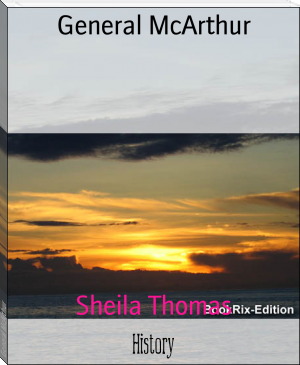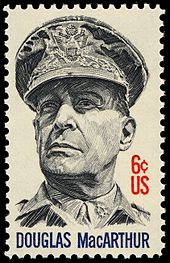General McArthur, Sheila Thomas [reading rainbow books txt] 📗

- Author: Sheila Thomas
Book online «General McArthur, Sheila Thomas [reading rainbow books txt] 📗». Author Sheila Thomas
MacArthur chose to accept it on the basis that "this award was intended not so much for me personally as it is a recognition of the indomitable courage of the gallant army which it was my honor to command."
Chapter 6
On 25 June 1950, North Korea invaded South Korea, starting the Korean War.The United Nations Security Council passed Resolution 82, which authorized a United Nations (UN) force to assist South Korea.The UN empowered the American government to select a commander, and the Joint Chiefs of Staff unanimously recommended MacArthur.He therefore became Commander-in-Chief of the United Nations Command (UNCOM), while remaining SCAP in Japan and Commander of the USAFFE.All South Korean forces were also placed under his command. As they retreated before the North Korean onslaught, MacArthur received permission to commit U.S. ground forces. All the first units to arrive could do was trade men and ground for time, falling back to the Pusan Perimeter.By the end of August, the crisis subsided. North Korean attacks on the perimeter had tapered off. While the North Korean force numbered 88,000 troops, Lieutenant General Walton Walker's Eighth Army now numbered 180,000, and he had more tanks and artillery pieces.
On 11 September, Truman issued orders for an advance beyond the 38th parallel into North Korea. MacArthur now planned another amphibious assault, on Wonsan on the east coast, but it fell to South Korean troops before the 1st Marine Division could reach it by sea.
Seoul fell in January 1951, and both Truman and MacArthur were forced to contemplate the prospect of abandoning Korea entirely. European countries did not share MacArthur's world view, distrusted his judgment, and were afraid that he might use his stature and influence with the American public to re-focus American policy away from Europe and towards Asia. They were concerned that this might lead to a major war with China, possibly involving nuclear weapons.
Chapter 7
Douglas MacArthur died at Walter Reed Army Medical Center on 5 April 1964, of biliary cirrhosis.Kennedy had authorized a state funeralbefore his own death in 1963, and Johnson confirmed the directive, ordering that MacArthur be buried "with all the honor a grateful nation can bestow on a departed hero."On 7 April his body was taken to New York City, where it lay in an open casket at the Seventh Regiment Armoryfor about 12 hours.That night it was taken on a funeral train to Union Station and transported by a funeral procession to the Capitol, where it lay in state. An estimated 150,000 people filed by the bier.
MacArthur had requested to be buried in Norfolk, Virginia, where his mother had been born and where his parents had married. Accordingly, on 11 April, his funeral service was held in St Paul's Episcopal Church in Norfolk and his body was finally laid to rest in the rotunda of the Douglas MacArthur Memorial (the former Norfolk City Hall and later courthouse).
In 1960, the mayor of Norfolk had proposed using funds raised by public contribution to remodel the old Norfolk City Hall as a memorial to General MacArthur and as a repository for his papers, decorations, and mementos he had accepted. Restored and remodeled, the MacArthur Memorial contains nine museum galleries whose contents reflect the general's 50 years of military service. At the heart of the memorial is a rotunda. In its center lies a sunken circular crypt with two marble sarcophagi, one for MacArthur,the other for Jean, who continued to live in the Waldorf Towers until her own death in 2000.
The MacArthur Chambers in Brisbane, Australia, hosts the MacArthur Museum on the 8th floor where MacArthur had his office.
 MacArthur commemorative postage stamp
MacArthur commemorative postage stamp
MacArthur has a contested legacy. In the Philippines in 1942, he suffered a defeat that Gavin Long described as "the greatest in the history of American foreign wars."[371] Despite this, "in a fragile period of the American psyche when the general American public, still stunned by the shock of Pearl Harbor and uncertain what lay ahead in Europe, desperately needed a hero, they wholeheartedly embraced Douglas MacArthur—good press copy that he was. There simply were no other choices that came close to matching his mystique, not to mention his evocative lone-wolf stand—something that has always resonated with Americans."
MacArthur's concept of the role of the soldier as encompassing a broad spectrum of roles that included civil affairs, quelling riots and low-level conflict, was dismissed by the majority of officers who had fought in Europe during World War II, and afterwards saw the Army's role as fighting the Soviet Union. Unlike them, in his victories in New Guinea in 1944, the Philippines in 1945 and Korea in 1950, he fought outnumbered, and relied on maneuver and surprise for success. The American Sinologist John Fairbank called MacArthur "our greatest soldier".
On the other hand, Truman once remarked that he did not understand how the US Army could "produce men such as Robert E. Lee, John J. Pershing, Eisenhower and Bradley and at the same time produce Custers, Pattons and MacArthur."His relief of MacArthur cast a long shadow over American civil-military relations for decades. When Lyndon Johnson met with William Westmoreland in Honolulu in 1966, he told him: "General, I have a lot riding on you. I hope you don't pull a MacArthur on me." MacArthur's relief "left a lasting current of popular sentiment that in matters of war and peace, the military really knows best", a philosophy which became known as "MacArthurism".
MacArthur remains a controversial and enigmatic figure. He has been portrayed as a reactionary, although he was in many respects ahead of his time. He championed a progressive approach to the reconstruction of Japanese society, arguing that all occupations ultimately ended badly for the occupier and the occupied. He was often out of step with his contemporaries, such as in 1941 when he contended that Nazi Germany could not defeat the Soviet Union, when he argued that North Korea and China were no mere Soviet puppets, and throughout his career in his insistence that the future lay in the Far East. This implicitly rejected White American contemporary notions of their own racial superiority. He always treated Filipino and Japanese leaders with respect as equals. At the same time, his Victorian sensibilities recoiled at leveling Manila with aerial bombing, an attitude the hardened World War II generation regarded as old fashionedWhen asked about MacArthur, Field Marshal Sir Thomas Blamey once said that "The best and the worst things you hear about him are both true."
West entrance of the MacArthur Tunnel in San Francisco, California
During his lifetime, MacArthur earned over 100 military decorations from the U.S. and other countries including the Medal of Honor, the French Légion d'honneur and Croix de guerre, the Order of the Crown of Italy, the Order of Orange-Nassau from the Netherlands, the Honorary Knight Grand Cross of the Order of the Bath from Australia, and the Order of the Rising Sun with Paulownia Flowers, Grand Cordon from Japan.
ImprintPublication Date: 03-01-2018
All Rights Reserved





Comments (0)